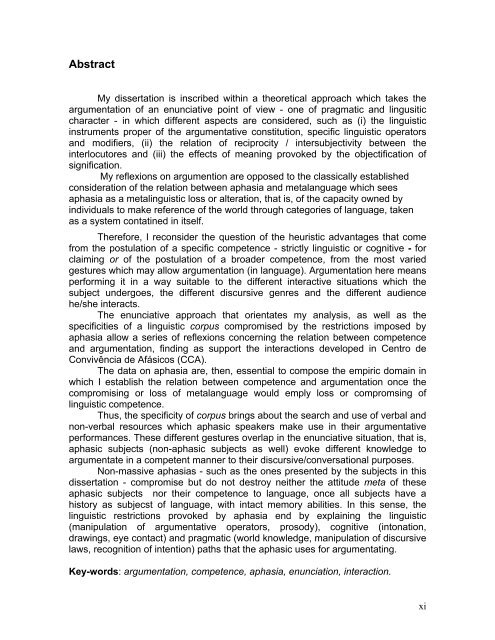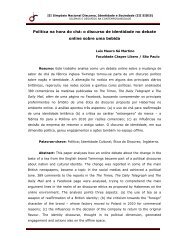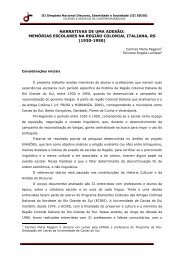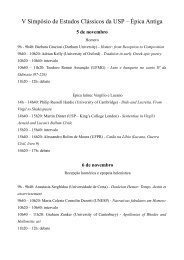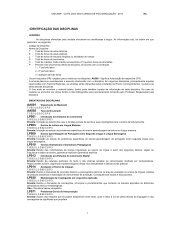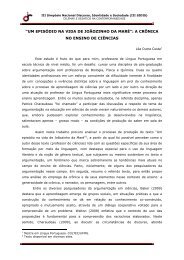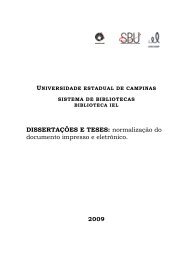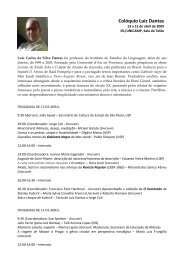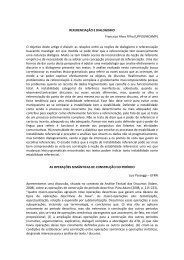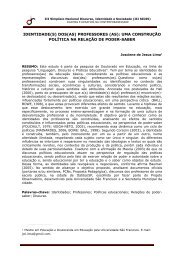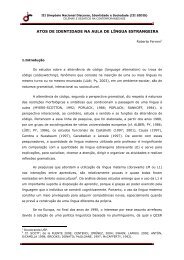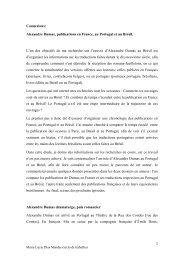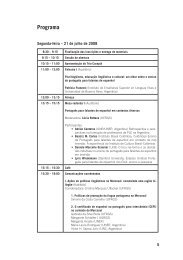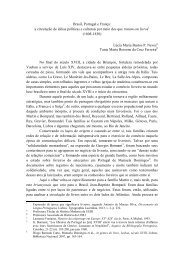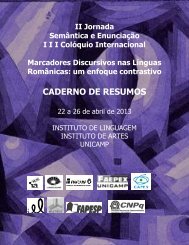Res<strong>um</strong>oMinha tese inscreve-se no interior de <strong>um</strong>a abordagem teórica que toma aarg<strong>um</strong>entação de <strong>um</strong> ponto de vista enunciativo, de caráter lingüístico-pragmático,em que diferentes aspectos são considerados, tais como (i) os instr<strong>um</strong>entoslingüísticos próprios da constituição arg<strong>um</strong>entativa, operadores e modificadoreslingüísticos específicos, (ii) a relação de reciprocidade/ intersubjetividade entre osinterlocutores e (iii) os efeitos de sentido provocados, a partir da objetivação dasignificação.Minhas reflexões relacionadas à arg<strong>um</strong>entação opõem-se à consideraçãoda relação classicamente estabelecida entre afasia e metalinguagem, queconsidera a afasia enquanto perda ou alteração metalingüística, ou seja, dacapacidade que os indivíduos têm de referenciar o mundo por meio de categoriasda língua, tomada como sistema encerrado em si mesmo.Neste sentido, retomo a questão em torno dos ganhos heurísticos advindosda postulação de <strong>um</strong>a competência específica – de ordem estritamente lingüísticaou cognitiva – para arg<strong>um</strong>entar, ou da postulação de <strong>um</strong>a competência de ordemmais abrangente, relativa às mais diversas semioses, que possibilite, em relação àlinguagem, arg<strong>um</strong>entar – e arg<strong>um</strong>entar aqui significa fazê-lo de maneira adequadaàs diferentes situações interativas de que o sujeito participa, em relação aosdiferentes gêneros discursivos e aos diferentes auditórios com que interage.A abordagem enunciativa com que orientei minhas análises, bem como aespecificidade de <strong>um</strong> corpus de linguagem comprometida pelas restrições que aafasia impõe, possibilitaram <strong>um</strong>a série de reflexões acerca da relação entrecompetência e arg<strong>um</strong>entação, com base <strong>nas</strong> interações desenvolvidas no Centrode Convivência de Afásicos (CCA).Os dados de afasia são, portanto, singulares para comporem o domínioempírico em que estabeleço a relação entre competência e arg<strong>um</strong>entação, <strong>um</strong>avez que o comprometimento ou perda da metalinguagem implicaria ocomprometimento ou perda da competência lingüística.Assim, a particularidade do corpus explicita a busca e o uso de recursosverbais e não-verbais utilizados pelos afásicos em suas condutas arg<strong>um</strong>entativas.Essas diferentes semioses se imbricam na situação enunciativa, o que implicadizer que os sujeitos afásicos (e também os não-afásicos) evocam saberesdiferentes, dos quais se valem para arg<strong>um</strong>entar de maneira competente emrelação a seus propósitos discursivo-conversacionais.As <strong>afasias</strong> não massivas - como as que apresentam os sujeitos desta tese -comprometem, mas não destroem por completo nem a postura meta destesafásicos, nem a sua competência relativamente à linguagem, <strong>um</strong>a vez que todostêm <strong>um</strong>a história enquanto sujeitos de linguagem, cuja memória não perderam.Nesta medida, as restrições lingüísticas provocadas pela afasia acabam porexplicitar os caminhos lingüísticos (manipulação de operadores arg<strong>um</strong>entativos,prosódia), cognitivos (entonação, desenhos, direcionamento do olhar) epragmáticos (conhecimento de mundo, manipulação de leis discursivas,reconhecimento de intenção) que o afásico percorre para arg<strong>um</strong>entar.Palavras-chave: arg<strong>um</strong>entação, competência, afasia, enunciação, interação.x
AbstractMy dissertation is inscribed within a theoretical approach which takes thearg<strong>um</strong>entation of an enunciative point of view - one of pragmatic and lingusiticcharacter - in which different aspects are considered, such as (i) the linguisticinstr<strong>um</strong>ents proper of the arg<strong>um</strong>entative constitution, specific linguistic operatorsand modifiers, (ii) the relation of reciprocity / intersubjectivity between theinterlocutores and (iii) the effects of meaning provoked by the objectification ofsignification.My reflexions on arg<strong>um</strong>ention are opposed to the classically establishedconsideration of the relation between aphasia and metalanguage which seesaphasia as a metalinguistic loss or alteration, that is, of the capacity owned byindividuals to make reference of the world through categories of language, take<strong>nas</strong> a system contatined in itself.Therefore, I reconsider the question of the heuristic advantages that comefrom the postulation of a specific competence - strictly linguistic or cognitive - forclaiming or of the postulation of a broader competence, from the most variedgestures which may allow arg<strong>um</strong>entation (in language). Arg<strong>um</strong>entation here meansperforming it in a way suitable to the different interactive situations which thesubject undergoes, the different discursive genres and the different audiencehe/she interacts.The enunciative approach that orientates my analysis, as well as thespecificities of a linguistic corpus compromised by the restrictions imposed byaphasia allow a series of reflexions concerning the relation between competenceand arg<strong>um</strong>entation, finding as support the interactions developed in Centro deConvivência de Afásicos (CCA).The data on aphasia are, then, essential to compose the empiric domain inwhich I establish the relation between competence and arg<strong>um</strong>entation once thecompromising or loss of metalanguage would emply loss or compromsing oflinguistic competence.Thus, the specificity of corpus brings about the search and use of verbal andnon-verbal resources which aphasic speakers make use in their arg<strong>um</strong>entativeperformances. These different gestures overlap in the enunciative situation, that is,aphasic subjects (non-aphasic subjects as well) evoke different knowledge toarg<strong>um</strong>entate in a competent manner to their discursive/conversational purposes.Non-massive aphasias - such as the ones presented by the subjects in thisdissertation - compromise but do not destroy neither the attitude meta of theseaphasic subjects nor their competence to language, once all subjects have ahistory as subjecst of language, with intact memory abilities. In this sense, thelinguistic restrictions provoked by aphasia end by explaining the linguistic(manipulation of arg<strong>um</strong>entative operators, prosody), cognitive (intonation,drawings, eye contact) and pragmatic (world knowledge, manipulation of discursivelaws, recognition of intention) paths that the aphasic uses for arg<strong>um</strong>entating.Key-words: arg<strong>um</strong>entation, competence, aphasia, enunciation, interaction.xi
- Page 1 and 2: Eliana da Silva TavaresCOMPETÊNCIA
- Page 3: Ficha catalográfica elaborada pela
- Page 7 and 8: Pedro.Aos amigos do GEAE de Barão
- Page 9: Índice1. Apresentação do problem
- Page 13 and 14: Nesse sentido, os dados de afasia s
- Page 15 and 16: justamente enquanto capacidade do l
- Page 17 and 18: linguagem ordinária a partir da co
- Page 19 and 20: a linguagem está na natureza do ho
- Page 21 and 22: manobra ducrotiana está a serviço
- Page 23 and 24: 2. ArgumentaçãoNeste capítulo, r
- Page 25 and 26: Platão provoca uma ruptura entre r
- Page 27 and 28: A Lógica dos predicados está vinc
- Page 29: objeto da Nova Retórica consiste n
- Page 33 and 34: suas intenções discursivas e toda
- Page 35 and 36: linguagem, na performatividade da l
- Page 37 and 38: de constituição mútuas. Nesse ca
- Page 39 and 40: o estudo do sentido deve levar em c
- Page 41 and 42: Nesse sentido, as qualidades intera
- Page 43 and 44: 3. CompetênciaMinha questão neste
- Page 45 and 46: elativamente a categorias como enun
- Page 47 and 48: Conceber competência dessa forma f
- Page 49 and 50: frases gramaticalmente bem-formadas
- Page 51 and 52: lembra, contudo, que a expressão c
- Page 53 and 54: Essas duas primeiras competências
- Page 55 and 56: hierárquica, o que, mais uma vez,
- Page 57 and 58: natureza sócio-cognitiva, e ainda
- Page 59 and 60: gramaticais, discursivas, pragmáti
- Page 61 and 62:
Argumentar, enfim, é algo que a l
- Page 63 and 64:
nosso café, compartilhando as cena
- Page 65 and 66:
convocam o locutor/ interlocutor a
- Page 67 and 68:
ET: nossa... eu quero muito conhece
- Page 69 and 70:
lhe oferece, mas em nenhum momento
- Page 71 and 72:
Nesta interação, o desenho de uma
- Page 73 and 74:
EM: gente... uma coisa é... o seu
- Page 75 and 76:
MS: a::h ((fazendo sinal de assenti
- Page 77 and 78:
neta e que seu nome é o mesmo de u
- Page 79 and 80:
somente para a expressão oral, mas
- Page 81 and 82:
JT: tão achando que é o ETA simSP
- Page 83 and 84:
unidade lexical vaga: evento. Em se
- Page 85 and 86:
Ducrot e colaboradores propõem-se
- Page 87 and 88:
Estabelecer a materialidade lingü
- Page 89 and 90:
enunciados modificados pelos operad
- Page 91 and 92:
necessárias, fazendo com que se to
- Page 93 and 94:
eu achei é-é-é eu achei um-um-um
- Page 95 and 96:
elativamente a enciclopédia boa pr
- Page 97 and 98:
seu eixo, cabendo então questionar
- Page 99 and 100:
Na Semântica ducrotiana, argumenta
- Page 101 and 102:
5. Considerações finaisA abordage
- Page 103 and 104:
intersubjetividade, faz com que ess
- Page 105 and 106:
6. Referências BibliográficasAMOS
- Page 107 and 108:
GUILLAUME, G. Temps et verbe. Paris
- Page 109 and 110:
_____. "Semântica e Argumentação
- Page 111 and 112:
ANEXOS
- Page 113 and 114:
Informações neuropsicológicas e
- Page 115 and 116:
4. EFSexo: masculinoData de nascime
- Page 117 and 118:
acompanhou até o final de 2002, qu
- Page 119:
UMA MÃO LAVA A OUTRAFigura 1Fonte:


